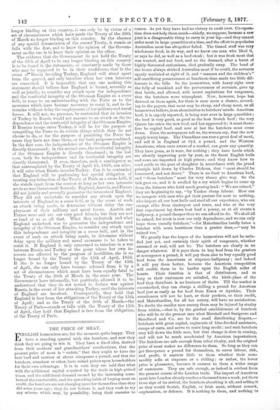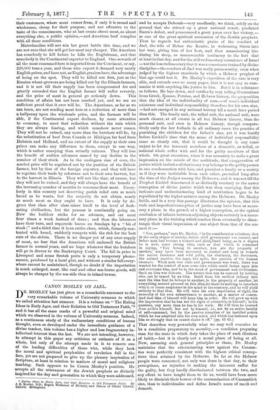THE PRICE OF MEAT.
ENGLISH housewives are, for the moment, quite happy. They have a standing quarrel with the butchers, and now they think they are going to win it. They have a fixed idea, derived from their mothers' and grandmothers' recollections, that the present price of meat is "unfair," that they ought to have the best beef and mutton at about ninepence a pound, and that the butchers, somehow or other, have raised prices upon householders for their own advantage. It is in vain they are told that what with the additional capital required by the trade in high-priced times, and the additional demand caused by the increasing num- bers of the comfortable, and the spreading habit of buying meat on credit, the butchers are not charging more for themselves than they did some years ago ; they do not believe it, and they rush to try any scheme which may, by possibility, bring their enemies to reason. As yet they have had no victory to exult over. Co-opera- tion does not help them much—chiefly, we suppose, because a raw joint is a disagreeable thing to carry in your lap—and they cannot order meat in large quantities at a time, and the effort to popularise Australian meat has altogether failed. The tinned stuff was very wholesome food, in its way, and we know one man who liked it, or says he did, as well as a beef-steak ; but it was fresh meat that was wanted, and not food, and so the demand, after a burst of highly-flavoured enthusiasm, died gradually away. The head of the house always shirked Australian meat if he could, the servants openly mutinied at sight of it, and "mamma and the children's" self-sacrificing perseverance at luncheon-time made too little dif- ference in the bills. So the housewives, with heavy sighs over the folly of mankind and the perverseness of servants, gave up that battle, and allowed, with secret aspirations for vengeance, that the butchers were triumphant. Now, however, hope has dawned on them again, for there is once more a chance, accord- ing to the papers, that meat may be cheap, and cheap meat, as all housewives believe, is an abomination to butchers' minds. American beef, it is eagerly reported, is being sent over in large quantities ; the beef is very good, as good as the best Scotch beef ; the very Queen has eaten the new beef, and has approved it; it must there- fore be capital beef, and now at last the butchers must come down. Even the newspapers tell us, the women say, that the new supply is very large. The Canadians can rear a great deal of meat, and sell it in England at 60. a pound, and the Western Americans, when once aware of a market, can grow any quantity. They have grass, as it were, for nothing ; they have herds which are silently improving year by year, as the finest English bulls and cows are imported at high prices ; and they know how to send cattle to the port of slaughter in accordance with the grand principle laid down by Charles Dickens, that "meat should be humoured, and not drove." There is no limit to American beef, and "those butchers" must for very shame give way. So the talk goes on, and it is swelled by a cry which begins to come up from the farmers who hold much grazing land : "We are ruined," they are beginning to say, "by Yankee cheap labour. How can we compete with men who get their pasture for next to nothing, who import all our best bulls and steal all our experience, who are exempt alike from rinderpest and rents, and who at the very first experiment lay down best beef a penny, or at all events a halfpenny, a pound cheaper than we can afford to do. We shall all be ruined, for stock is now our only dependence, and we can only hope those rascally butchers,"—for Materfamilias hardly hates a butcher with more heartiness than a grazier does,—" may be ruined too."
We greatly fear the hopes of the housewives will not be satis- fied just yet, and certainly their spirit of vengeance, whether assumed or real, will not be. The butchers are clearly in no danger whatever. If it pays them to buy beef from the graziers at sevenpence a pound, it will pay them also to buy equally good beef from the Americana at sixpence-halfpenny ; and indeed it will pay them better, because the American competition will enable them to be harder upon the English seller of beasts. Their function is that of distributors, and as long as their customers are satisfied, the birth-place of the beef they distribute is no business of theirs. Till the market is overstocked, they can charge a shilling a pound for American beef just as easily as for beef from Essex or Ayrshire. Their consciences will not be hurt, or their pockets, or their credit, and Materfamilias, for all her outcry, will have no satisfaction. No doubt the smaller men among them may be injured by rivalry from within,—that is, by the gradual establishment of butchers who will be to the present race what Marshall and Snelgrove and Shoolbred and Co. are to the small distributing drapers,— butchers with great capital, regiments of blue-frocked assistants, camps of carts, and nerve to resist long credit ; and such butchers may kill down the little men, but that change is slow in coming, and will not be much accelerated by American importations. The butchers are safe enough from other rivalry, and the original price of meat makes no difference to them. So long as they can get threepence a pound for themselves, to cover labour, risk, and profit, it matters little to them whether their com- modity sells at sixpence or a shilling ; or rather, the lower price is pleasanter, because it ensures to them a wider range of customers. They are safe enough, as indeed is evident from the present course of the London trade. The import of American meat into London already reaches a thousand tons a week, yet there is no sign of its arrival, the butchers absorbing it all, and selling it as they would Scotch, English, or Irish meat, without remark, explanation, or defence. It is nothing to them, and nothing to their customers, where meat comes from, if only it is sound and wholesome, cheap for their purpose, and not offensive to the taste of the connoisseurs, who at last create about meat, as about everything else, a public opinion,---and American beef complies with all these conditions.
Materfamilias will not win her great battle this time, and we are not sure that she will get her meat any cheaper. The American has somebody to kill before he kills the Englishman, and that somebody is the Continental exporter to England. One-seventh of all the meat consumed here is imported from the Continent, or say, 220,000 tons a year, and those who export it demand very nearly English prices, and have not, as English graziers have, the advantage of being on the spot. They will be killed out first, just as the Russian wheat-growers are being killed out by the Illinois farmers, and it is not till their supply has been compensated for and greatly exceeded that the English farmer will suffer severely,
and the price of meat in general go seriously down. This condition of affairs has not been reached yet, and we see no sufficient proof that it ever will be. The Americans, as far as we can learn, are not sending meat here at a reduction of more than a halfpenny upon the wholesale price, and the farmers will be able, if the Continental export declines, by more attention to economy, to meet that reduction without the ruin which they are always fearing, and which somehow never comes. They will not be ruined, any more than the butchers will be, by the substitution of beef from Canada or Michigan for beef from Holstein and Holland, and no extent of the supply at their own prices can make any difference to them, except in one way, which is rather annoying than actually ruinous. They will lose the benefit of sudden advances caused by any decline in the number of their stock. As in the analogous case of corn, the market price will be regulated not by the position of the British farmer, but by that of the foreign exporter, and they will have to regulate their trade by reference not to their own harvest, but to the harvest in Illinois. They will not like that, of course, but they will not be ruined, and they will always have the benefit of the increasing number of mouths to consume their meat. Every- body in this country not deserving parish relief eats as much bread as he wants, but the majority do not obtain nearly as much meat as they ought to have. It is only by de- grees that class after class raises itself to the level of flesh- eating civilisation, but the process is continually going on. Now the builders strike for an advance, and eat meat four times a week instead of three ; and then the labourers have their turn, and supersede bacon on Sundays by a "bit of steak ;" and a third time it is an entire class, which, formerly con- tented with bread, suddenly compete with the rich for the best cuts of the sirloin. There is no danger yet of any over-supply of meat, no fear that the American will undersell the British farmer in normal years, and no hope whatever that the butchers will go in droves to the Bankruptcy Court. The fall in price in Liverpool and some Scotch ports is only a temporary pheno- menon, produced by a local glut, and without a similar fall every- where cannot be maintained, though no doubt if the importation is much enlarged, meat, like coal and other sea-borne goods, will always be cheaper by the sea-side than in inland towns.







































 Previous page
Previous page